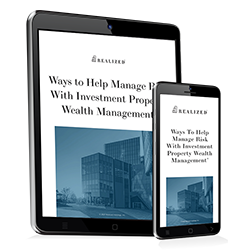Page 2 11 - 20 of 142
How to Quantify and Integrate Real Estate Risk Into Portfolio Planning

Real estate has long been viewed as an inflation-resistant asset class, but like all investments, it carries risk, and sometimes in less obvious forms than equities or bonds. For advisors helping clients incorporate real estate into broader wealth strategies, understanding and quantifying these risks can be an important step in developing a more complete picture of the client’s overall financial situation.
Real Estate Investment Risk: What You Need To Consider

Investing in real estate has long been recognized as a means to build wealth and generate a steady income — and for many investors, real estate properties are the main assets in their portfolios. However, this doesn’t mean that real estate doesn’t have any risks. In fact, there are several types of risks associated with this industry. Understanding each of these challenges is critical to ensure protection for your capital, increase the potential for high returns, and decrease the chance of loss.
What Is the 10% Rule in Real Estate Investing?

The 10% rule actually consists of three rules. They are meant to be a quick and minimal way for real estate investors to check that they are getting a good deal on their investment. Having some simple-to-follow rules in your back pocket is always a helpful tactic to eliminate potential bad deals early on and with little effort.
How Banks Manage Liquidity Risk

Banks, like businesses and individual investors, face the challenge of liquidity risk. The principle of managing liquidity risk for banks involves ensuring that cash inflow, or income, is timed appropriately to meet upcoming financial obligations. Banks employ a range of strategies to ensure adequate liquidity, including maintaining reserves with the central bank, borrowing on the interbank market, leveraging intra-group borrowing, or investing in readily marketable assets like government bonds.
What Is the Rule of 69 Percent In Real Estate Investing?

Investors love to use rules to help them predict outcomes. For example, there is a one-percent rule (a one-percent increase in interest rates equates to ten percent less you can borrow to keep the same payment), a two-percent rule (the percentage of a home’s cost that you should be asking for in monthly rent), and more. Some of these rules can help estimate potential results, but others are outdated or possibly never really held much value.
What Is the 2% Rule in Real Estate Investing?

Unlike some other famous maxims in real estate investing (like the seventy percent rule, for example), the two percent rule is widely discredited in most U.S. metropolitan areas. The rule holds that the rental amount should equal two percent of the property's purchase price. By that calculation, if you purchase a house for $100,000, the monthly rent should be $2,000. That seems unrealistic at first glance and becomes even less likely the deeper you dig in.
What Is the 50 Percent Rule In Real Estate Investing?

Like many rules of real estate investing, the 50 percent rule isn’t always accurate. However, it can be a helpful way to estimate expenses for a rental property. To use it, an investor takes the property's gross rent and multiplies it by 50 percent, providing the estimated monthly operating expenses. That sounds easy, right? If the property rents for $4,000 a month, operating costs should be approximately $2,000.
Why is a Cap Rate Important?

Cap rates are one of the go-to tools real estate investors use when valuing a property. Cap rates provide a quick and easy way to determine a property's value. But cap rates shouldn't be used in isolation. Understanding how to derive a cap rate and knowing the right context are critical factors in getting the most out of a cap rate.
What is the Opposite of Cap Rate Compression?

Cap rate is a shortened reference to capitalization rate, which is an illustrative metric used to evaluate the attractiveness of an investment. The cap rate generally identifies how long it will take the investor to recover their investment. You can determine the cap rate using this formula:
What are the Advantages and Limitations of the Markowitz Model?

The Markowitz Model was developed in 1952 and has remained a cornerstone of portfolio construction. Some swear by the theory, while others see weaknesses. Let's examine these differences to better understand the practical uses of the Markowitz Model.
Page 2 11 - 20 of 142


